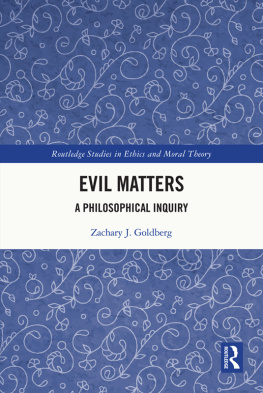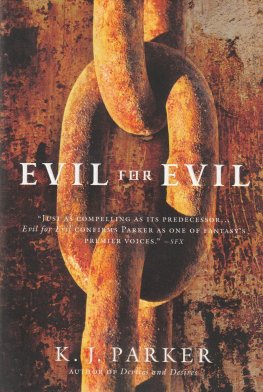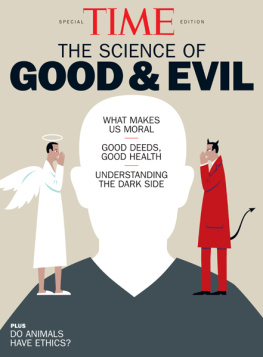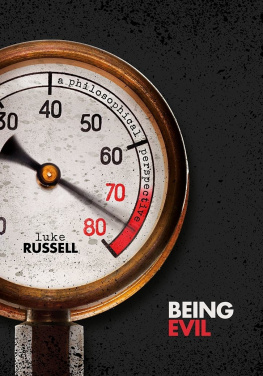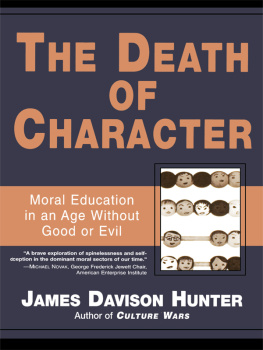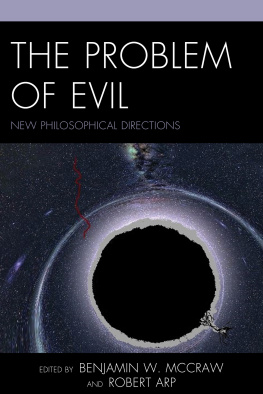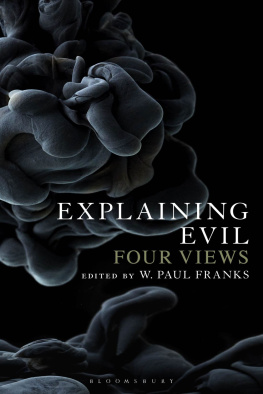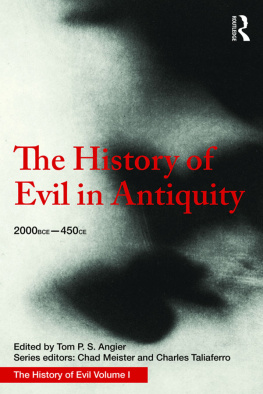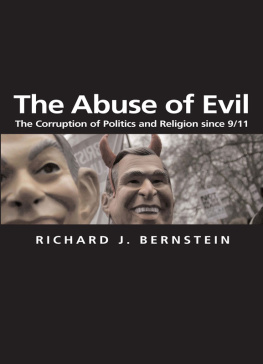Contents

Evil Matters: A Philosophical Inquiry
This book explores the nature, normativity, and aftermath of evil action. It combines philosophical conceptual analysis with empirical studies in psychology and discussions of historical events to provide an innovative analysis of evil action.
The book considers the metaethical, normative, and practical characteristics belonging to evil action. It begins by identifying the features of evil action that distinguish it from mundane wrongdoing, thereby placing it as a proper category of philosophical inquiry. Next, the author demonstrates how evil acts affect moral relationships and challenge Strawsonian accounts of moral responsibility. He then draws conceptual and empirical connections between evil acts and collective agency by discussing collective acts of evil such as genocide, torture, and slavery. Finally, the author scrutinizes both the possibility and propriety of forgiveness and vengeance in the aftermath of evil and discusses how individuals ought to cope with the pervasiveness of evil in human interaction.
Evil Matters will be of interest to advanced students and researchers in philosophy working on the concept of evil, moral responsibility, collective agency, vengeance, and forgiveness.
Zachary J. Goldberg is Senior Researcher at Trilateral Research and formerly Postdoctoral Research Fellow at Ludwig-Maximilians-Universitt Munich, Germany. In addition to his authored articles and book chapters focusing mainly on issues concerning the philosophy of evil and moral responsibility, he is the editor of Reflections on Ethics and Responsibility: Essays in Honor of Peter A. French (2017), and co-editor of The Routledge International Handbook of Perpetrator Studies (2020).
Routledge Studies in Ethics and Moral Theory
Getting Our Act Together
A Theory of Collective Moral Obligations
Anne Schwenkenbecher
Love, Justice, and Autonomy
Philosophical Perspectives
Edited by Rachel Fedock, Raja Rosenhagen, and Michael Khler
From Value to Rightness
Consequentialism, Action-Guidance, and the Perspective-Dependence of Moral Duties
Vuko Andri
Practical Wisdom
Philosophical and Psychological Perspectives
Edited by Mario De Caro and Maria Silvia Vaccarezza
Virtues, Democracy, and Online Media
Ethical and Epistemic Issues
Edited by Nancy E. Snow and Maria Silvia Vaccarezza
Evil Matters
A Philosophical Inquiry
Zachary J. Goldberg
Desert Collapses
Why No One Deserves Anything
Stephen Kershnar
For more information about this series, please visit: https://www.routledge.com/Routledge-Studies-in-Ethics-and-Moral-Theory/book-series/SE0423
First published 2022
by Routledge
605 Third Avenue, New York, NY 10158
and by Routledge
2 Park Square, Milton Park, Abingdon, Oxon, OX14 4RN
Routledge is an imprint of the Taylor & Francis Group, an informa business
2022 Taylor & Francis
The right of Zachary J. Goldberg to be identified as author of this work has been asserted by him in accordance with sections 77 and 78 of the Copyright, Designs and Patents Act 1988.
All rights reserved. No part of this book may be reprinted or reproduced or utilized in any form or by any electronic, mechanical, or other means, now known or hereafter invented, including photocopying and recording, or in any information storage or retrieval system, without permission in writing from the publishers.
Trademark notice: Product or corporate names may be trademarks or registered trademarks, and are used only for identification and explanation without intent to infringe.
Library of Congress Cataloging-in-Publication Data
A catalog record for this title has been requested
ISBN: 978-0-367-89402-3 (hbk)
ISBN: 978-1-032-05242-7 (pbk)
ISBN: 978-1-003-02157-5 (ebk)
Typeset in Sabon
by KnowledgeWorks Global Ltd.
- A Version Appeared as Can Kants Theory of Evil Be Saved?' Kantian Review (): 395419, 2017.
- Portions of Chapters Appear as A Relational Approach to Evil Action: Vulnerability and Its Exploitation. Journal of Value Inquiry (): 3353, 2019.
- Portions of Appear in Evil's Diachronic Elements. In Routledge Handbook of the Philosophy of Evil, edited by Thomas Nys and Stephen de Wijze. London: Routledge, 2019.
- Portions of the Appendix Appear in Evil, Evil and Taking Responsibility. In Wozu ist das Bse gut?, edited by Birgit Recki, 1736. Mnster: Mentis.
This book is the outcome of the research project Components of Evil: An Analysis of Secular Moral Evil and its Normative and Societal Implications financed by the Deutsche Forschungsgemeinschaft and carried out at the Chair for Practical Philosophy and Ethics held by Prof. Monika Betzler, Ludwig-Maximilians-Universitt in Munich from 20162019. I am extremely grateful to Monika for her comments on the entire manuscript, frequent discussions about its content, and ample opportunities to present and discuss my work with her students. I would also like to thank Prof. Julian Nida-Rmelin and Prof. Beate Sodian for comments on the text as well as Prof. Alex Hutter and Prof. Peter Adamson for discussions about evil in the history of philosophy. Finally, I would like to thank my father, Prof. Harold Goldberg, who proofread and edited each chapter, sometimes multiple times, and was always ready to provide me with historical examples of evil action.
This book seeks to advance the understanding of critical ethical, social, and philosophical aspects of evil action. In explaining what this book is about, I think it is helpful to start with what it is not about and what it does not aim to accomplish. It is worth noting right at the outset that this book is not a systematic theory of evil. Such works already exist, and much of the present book emerges out of these previous discussions and analyses. As the reader will notice, my thinking about the concept of evil has benefited immensely from the extant philosophical literature on evil. I have found that most of the authors who have written about the philosophy of evil have provided insightful and often correct assessments of the nature and normativity of evil. I consider these authors to be my teachers, and this book is a product of my learning.
As any good teacher will tell you, they hope their students will ask questions. Through asking questions, the teacher recognizes that the student has reflected upon the lesson. Especially in philosophy, asking questions is essential to the advancement of our understanding, not only because we learn new things but because we also identify further complexities and additional questions that compel us to continue our investigation.
This book is a collection of the questions that inspired me to engage more closely with the philosophical analysis of evil and corresponding discussions that accompany these questions. As reflected by the title, this book is truly an inquiry, which raises enduring or under-explored questions about particular matters concerning the nature, normativity, and aftermath of evil action. Indeed, in thinking about evil action as a concept and phenomenon, a multitude of questions immediately come to mind: what makes an action evil and not simply bad or wrong, how can so many seemingly ordinary people perpetrate acts of extreme evil, should perpetrators of evil acts be forgiven?

